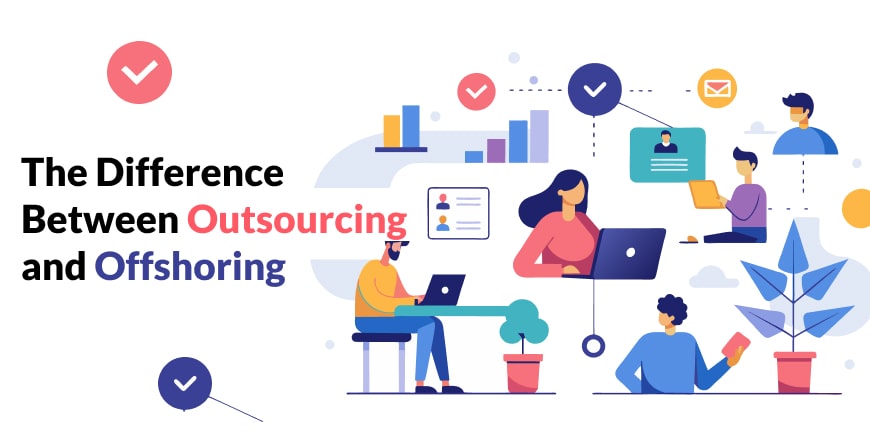
The Role of Empathetic Leadership in Shaping Modern Indian Workplaces
16/06/2025
How Japanese Language Training Boosts IT Hiring in Japanese Firms?
18/06/2025- Introduction
- What is Outsourcing?
- What is Offshoring?
- What are the vital Differences between Outsourcing and Offshoring?
- What Are the Advantages of Outsourcing?
- What Are the Advantages of Offshoring?
- What is the Process of Outsourcing and Offshoring?
- What are the Cons of Offshoring and Outsourcing?
- Cons of Outsourcing
- Cons of Offshoring
- When Should a Company Choose Outsourcing vs. Offshoring?
- Frequently Asked Questions (FAQs)
Introduction
In today’s fast-paced and connected global economy, outsourcing and offshoring are not just cost-saving techniques but also impactful tools that drive innovation, action, and competitive advantage. What began as a process to deploy non-core jobs has now become a business initiative to dive into the pool of vast global talent, accelerating digital transformation, and dynamic scaling.
As the lines blur and technology traverses time zones, offshoring and outsourcing become a strong impetus for global collaboration and success.
What is Outsourcing?
Outsourcing is a process in which a company collaborates with an external unit to provide services and manage specific tasks. The method is cost-effective, enabling businesses to concentrate on their relevant core initiatives and objectives. The approach also gives organizations exposure to specialized talent.
What is Offshoring?
The transfer of business processes or the proprietorship of a company to a foreign country, primarily driven by lower labour costs or more favourable regulatory environments, is known as offshoring.
What are the vital Differences between Outsourcing and Offshoring?
There are many differences between outsourcing and offshoring. The major difference between outsourcing and offshoring is that outsourcing entails the deployment of services or specific tasks to external agencies. In contrast, offshoring involves the deployment of entire business functions to international destinations.
What Are the Advantages of Outsourcing?
Here are a few major pros of outsourcing:
1. Cost Efficiency
Companies can reduce their costs significantly by adopting outsourcing. They can spend less money on hiring labour in foreign countries with lower labour costs. Companies can also save money by not investing in infrastructure that includes workspace and equipment.
Another reason it is cost-effective is that organizations do not have to spend on training programs for in-house staff and heavily on recruitment.
2. Improved Productivity
With outsourcing, businesses can get easy access to niche expertise and skills, making processes smooth and highly productive. Businesses also have the advantage of concentrating on their core operations, enhancing efficiency.
The productivity also improves as there is work happening around the clock, across time zones. With experts on board, the projects are completed faster, making the process agile and accelerating productivity.
3. Scalability and Flexibility
The operations of businesses can be adjusted according to their requirements if they outsource employees and decide whether to enhance or reduce resources. Business requirements keep evolving, and outsourcing enables them to cater to the new market changes.
There is also the risk factor associated with certain projects or jobs that is shared with the outsourcing agency, making it easier for companies to function.
What Are the Advantages of Offshoring?
The benefits of offshoring and outsourcing are almost similar. Let us look at some of the outsourcing advantages:
1. Cost Effective
Like outsourcing, offshoring also helps organizations to reduce costs in terms of labour, especially for niche tasks, as salaries in some foreign locations are relatively lower. A company can also save on other operational costs with offshoring, like rent, infrastructure, and other miscellaneous costs.
2. Exposure to Niche Talent
Businesses can access a range of global talent and can select them as per their requirements. The professionals have their expertise and can help companies with various projects and tasks, enhancing efficiency and quality of work. This kind of talent might not be easily available in their home countries.
3. Productivity Enhancement
Offshore services are available 24/7, as international time zones differ, and operations benefit from accelerated operations as productivity automatically increases. Companies can be less burdened by giving responsibilities to offshore companies and can focus on their core plans and innovations. Projects can also be completed faster due to easy access to expert talent and a systematic process.
What is the Process of Outsourcing and Offshoring?
The outsourcing and offshoring processes are conducted diligently as organizations want top-notch services and talents for their operations.
1. Here is how outsourcing is facilitated:
Primarily, a firm will identify the operations that require specialized or external services to enhance them. The second step is to look for a trusted partner like Alp Consulting. Extensive research is required to search and decide on a partner who has an excellent track record, experience, and expertise in managing niche operations.
A partner with a wide range of talent available to them can support companies and accelerate their efficiency.
After choosing the vendor, a company starts discussing the type of service it requires, the talent requirements, and payment terms. Collaborating with an organization is not just about offering services but managing them effectively with the help of communication networks and tools to measure the performance levels. This is what partners do after they understand the company’s needs and goals.
2. Here is how offshoring is facilitated:
Offshoring is a practice in which organisations first determine the areas of operations that require relocation, keeping in mind various elements like labour costs, infrastructure, and labour availability.
The second step is to select a country that caters to the organisation’s vision and aspirations, along with the needed infrastructure, and consider the legal and environmental laws and regulations.
The next important step is to set up operations in a new location with suitable infrastructure and hire local workers, complying with all the laws and norms necessary. The operations need to be properly managed and monitored, as a flawless integration must be in place using appropriate communication methods.
What are the Cons of Offshoring and Outsourcing?
The pros and cons of offshoring and outsourcing are plenty. We have already talked about the pros; now let us check out the cons of each of the practices.
Cons of Outsourcing
1. Lost Control
Jobs are outsourced and delegated to a third party, so a company might lose part of its control to the external agency and might not have its say in certain matters. This could result in disagreements and disruptions in achieving company goals.
The agreements made in outsourcing can be stringent, driving companies to tailor them to their business requirements and objectives.
An organization may get too dependent on external sources, which might cause problems if the relationship faces flak or the provider is unhappy.
2. Communication Hazards
One of the most significant challenges faced by companies is the language hurdle as outsourcing to international countries becomes tough when it comes to communication, as different countries have different cultures and languages, and there are chances of misinterpretations and miscommunication.
The factor of time zones might also impact the efficiency of operations, as collaboration might become tough. Coordinating becomes a hassle if proper channels and tools are not utilized, adversely affecting productivity.
3. Security Breaches
The moment tasks are outsourced, there will be a transfer of sensitive data and information. If a robust security system is not in place, then there is are high risk of a security breach.
Sometimes, the providers might take advantage of intellectual property or sensitive data if not safeguarded properly. Strict security protocols need to be maintained to keep the risks in check.
4. Impact on Company Values and Workers
Outsourcing impacts current employees as they might feel threatened that they will lose their jobs to outsourced, cheaper talent. The approach can also dampen the spirit and motivation of the teams as they might feel that their work is not respected and acknowledged enough.
In-house teams might lose out on learning and developing new skills and expertise, as they might feel the pressure of external teams being prioritized.
Cons of Offshoring
1. Time Zone Issue
Organizations resort to offshoring only when they find that the labour costs in foreign countries are significantly lower and profitable. The offshore business takes organisations to different time zones with their partners and teams in different zones might face difficulty coordinating and communicating, resulting in project delays and miscommunication.
2. Quality Control Problems
Quality-related issues are always a concern with offshoring processes, as the products and services provided in other countries differ from the home country. Despite continuous efforts to explain what a company’s expectations the standards of the product might not be met, and quality might drop, leading to delays in the supply chain and affecting the outcome.
3. Payroll and Compliance Concerns
Offshoring involves the functioning of two systems simultaneously. These systems are payroll and compliance. They are controlled both domestically and from offshore locations.
There will be added paperwork that will incur additional costs, and also the risk of unintentionally missing out on adhering to compliance requirements, driving the productivity of the employees to dip.
4. Negative Brand Image
A company might face criticism for offshoring, as the mentality remains that offshoring means job opportunities available in the home country are drained. The negative feedback and reports not just affect the brand image but will also dampen the morale of employees, as they might feel neglected and not valued enough.
When Should a Company Choose Outsourcing vs. Offshoring?
The future of outsourcing and offshoring looks promising. Organizations must opt for outsourcing if they need people for short-term projects or tasks with tight deadlines and that require specific expertise.
Outsourcing enables quick adjustments for businesses in terms of workforce, with changing market trends. It is a cost-effective practice and allows organizations to focus on core initiatives and goals.
Offshoring is a long-term investment for companies, where they can cut down on operational and labour costs significantly. Businesses can access a wide range of global professionals with niche skills.
The long-term plan includes companies forming dedicated teams integrated seamlessly and offering required services. Organizations also capitalize on different time zones as they receive services around the clock, enhancing profitability.
Frequently Asked Questions (FAQs)
1. What is the difference between outsourcing and offshoring?
The method of partnering with outside agencies or third parties to outsource services and specific tasks is outsourcing, while offshoring entails the shifting of an entire business operation to a foreign country.
2. What are common examples of outsourcing?
Companies usually outsource jobs like IT support, HR functions, and legal support to external specialized experts, and common outsourcing services entail customer care, software development, manufacturing, and many more.
3. What industries commonly use offshoring?
Sectors like technology, e-commerce, manufacturing, healthcare, and financial services usually go for offshoring.
4. Is outsourcing suitable for small businesses?
Outsourcing is profitable for small businesses, giving them access to specialized talent, enabling them to reduce expenses and improve efficiency.
5. How to decide between outsourcing and offshoring?
For outsourcing, factors that need to be considered are expenses, cultural diversity, control, and specialized professionals. While for offshoring, factors like long-term, plans, cost, location, and business goals are required to be weighed.
Contact Us For Business Enquiry

Kasthuri R
Kasthuri R is the Co-Founder & Executive Director at ALP Consulting, bringing over 23 years of experience in search, staffing, and HR consulting. She has been instrumental in driving ALP’s recruitment, employee leasing, and executive search practices across diverse industry verticals. With deep expertise in talent acquisition, HR strategy, and operational management, Kasthuri has built scalable, client-focused solutions that enhance workforce efficiency. Her strategic leadership continues to steer ALP Consulting toward innovation and excellence in people management.




